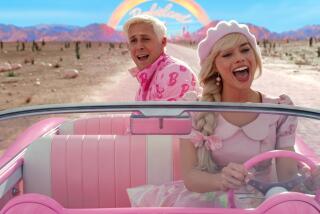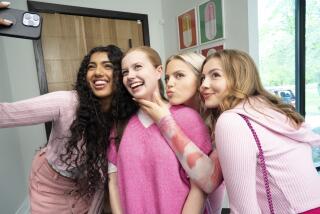‘Harry Potter’ may work its magic at box office and break records
She had steamed the wrinkles out of her wizard robe. The butterbeer, based on the house drink at Hogsmeade, was brewing. And she had reserved her apartment building’s screening room to get pumped by watching the boy wizard’s last two big-screen adventures.
Celeste Perez was as ready as she could be for the end of “Harry Potter.” The 24-year-old resident of downtown L.A. has been a fan since 1998, when anEnglish teacher sneaked her a copy of the first book in the series about an orphan who discovers he has magic powers, which was banned at her Christian school.
When “Harry Potter and the Deathly Hallows — Part 2” opens in theaters Friday, it will mark the end not just of the most successful film franchise in modern Hollywood, but the most impactful piece of pop culture for a generation.
“This is the end of my childhood,” Perez said while preparing for a Thursday night party with friends, after which they would attend a midnight screening of the film. “It’s like, ‘Now what’s left for me? What can I cherish as much?’”
The combination ofsadness and enthusiasm felt by Perez and millions of fans like her is the reason Hollywood is expecting box office records to fall this weekend, when the film, a fast-moving, 130-minute battle to the death between Harry Potter and his evil nemesis, Lord Voldemort, opens in theaters. Already, more than 10,000 midnight Friday shows and nearly every Imax screening through Saturday have sold out, giving the film an estimated $45-million box office Thursday before the theater doors opened — more than most movies gross their entire first weekend.
The movie is not only getting the best reviews in the series, but it’s also the first that will benefit from higher-priced 3-D tickets. As a result, the $158.4-million record for a three-day domestic opening, held by 2008’s “The Dark Knight,” also from Warner Bros., is in jeopardy.
“With the 3-D and the huge sense of urgency among fans to be the first to see this film, it has as good a shot as you can have to break the record,” said Vincent Bruzzese, president of the worldwide motion picture group for research firm Ipsos OTX.
And even though the movie is the last in the series — author J.K. Rowling has said she has no plans to write more “Harry Potter” novels — Warner and other corporate partners hope to keep the cash registers ringing well into the future with the sale of toys, DVDs, exhibitions, digital media and theme parks.
Although the first novel, “Harry Potter and the Sorcerer’s Stone,” was published only in 1997 and the first film came out in 2001, the series is thoroughly embedded in the culture. Recent surveys conducted by the market research firm E-Poll on top entertainment brands such as Batman, “Star Trek” and the “Twilight” vampire series ranked Potter second among all audiences in awareness and appeal (behind the much older “Star Wars”) and first among people ages 13 to 24. On the question of whether people want to buy new products related to the brand, Potter is a decisive No. 1.
“That data is code-word for ‘We still want more,’” said Gerry Philpott, chief executive of E-Poll.
Jesse Martinez andFabian Rodriguez are among those who want more. The two teens took a morning bus from Downey to Hollywood on Thursday to be the first waiting outside Grauman’s Chinese Theatre for a midnight screening. Jesse, 17, was dressed like Harry Potter with round glasses, a cloak, a sweater and a self-drawn lightning bolt on his forehead. He sipped a caffeinated drink to keep awake. A Starbucks barista had aptly written his name as Harry Potter on the cup.
“I wouldn’t doubt it if I cried tonight, honestly,” Jesse said. “But I’ll keep up with the actors, and I already bought tickets to the Orlando theme park.”
In downtown Chicago, 21-year-old Adel Johnson was camped outside a multiplex Thursday afternoon with her 18-year-old sister Tess. They were watching previous “Harry Potter” movies on a laptop while waiting for a midnight screening. They also had tickets to see the movie two more times over the weekend.
“I’ve had new ‘Harry Potter’ things to look forward to since I was 8,” said Adel, who recently graduated from Columbia College. “It’s kind of ridiculous how you feel like you’ve insinuated yourself [into] the story. You’ve grown up with them, and now you’re matriculating with them.”
Although its popularity is anchored in Rowling’s vivid characters and inventive milieu — the books have sold more than 450 million copies to date — the “Harry Potter” franchise also has benefited from timing, experts say.
“The book featured kids on their own getting very little help from adults — and it came out right as the Internet age was taking hold,” said Karen Sternheimer, a sociology professor at USC who has included “Harry Potter” books on her syllabi. “With the Internet, communities can be formed with fans, and the story continues to live on.”
Rowling herself has leveraged the Internet, recently launching a website, Pottermore.com, that will be the exclusive home for “Harry Potter” e-books and audio books. She also will later include other interactive features on it.
Moreover, the film rights became available at a time when the studios were more willing to take a risk on original material. Warner Bros. jumped in before the books became international bestsellers and took a chance on a series that is indelibly British in its sensibility and has not featured an American actor in a major role.
“An unpublished novel from an unknown author would be a much harder sell in today’s Hollywood,” said producer David Heyman, who brought the books to the studio. “I feel lucky to have started ‘Harry Potter’ when I did.”
But “Harry Potter” has turned out to be the most consistently successful franchise in Hollywood history, bringing Warner more than $1 billion in profits from the films and related products, according to the company. Warner has experience in the difficulties of sustaining a franchise, as evidenced by the eight-year gap between the 1997 flop “Batman & Robin” and the successful 2005 reboot “Batman Begins.”
The Wizarding World of Harry Potter attraction at Universal Studios in Orlando has drawn more than 7 million people since it opened last year and will probably be expanded, as well as possibly replicated elsewhere. More than 42 million Harry Potter video games have been sold, and the studio is expected to make more in the coming years. “Harry Potter: The Exhibition,” featuring paraphernalia and film-inspired settings, has toured the U.S. and Canada and is now headed overseas. Warner is also turning the British studio complex where it shot the movies into a permanent exhibit. Moreover, Warner executives say that with “Harry Potter” they have a built-in multigenerational audience.
“This is an evergreen property with an audience that can expand as the kids who started with it become parents and show it to their kids,” said Warner Chief Executive Barry Meyer. “And when the audience expands, there are more people reading the books, buying the movies and going to the parks.”
That appeal — and its limits — were on display during a marathon showing of the previous seven movies in Gurnee, Ill., 45 miles north of Chicago, on Thursday. In attendance were 10-year-old Alex Garner and her grandmother, Terri Green.
Alex was grim when asked if there would be life after “Harry Potter.”
“I am really sad because this is sad, and this means there’s nothing to look forward to. Nothing.”
Green, jumped in, trying to be positive: “We’re fans of the ‘Twilight’ series, though. Right?”
“No,” the girl said, “we’re not.”
Chicago Tribune staff writers Christopher Borelli and Mark Caro contributed to this report.
More to Read
The biggest entertainment stories
Get our big stories about Hollywood, film, television, music, arts, culture and more right in your inbox as soon as they publish.
You may occasionally receive promotional content from the Los Angeles Times.







